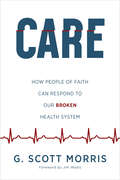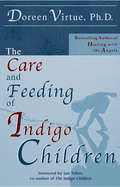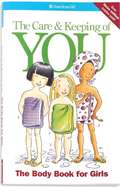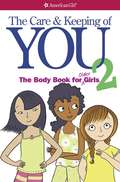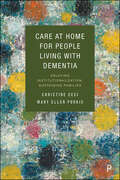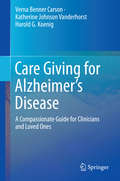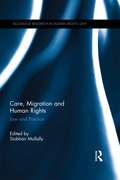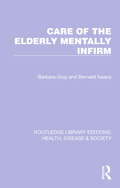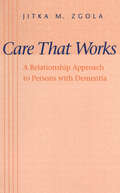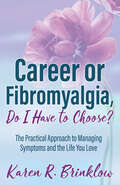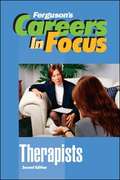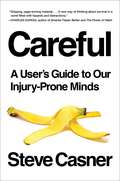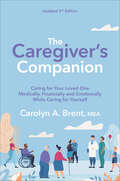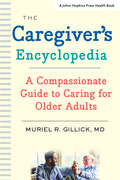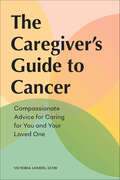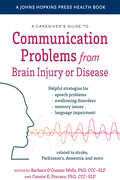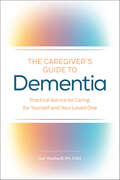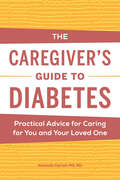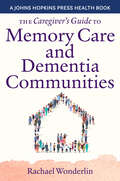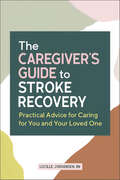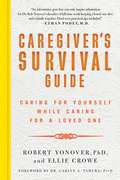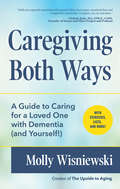- Table View
- List View
Care: How People of Faith Can Respond to Our Broken Health System
by G. Scott MorrisOur health system doesn&’t work for the most vulnerable. It&’s time for people of faith to respond with concrete action to demonstrate God&’s love and effect real change. Here&’s how.The dialogue on how to fix US health care is mired in partisan policy debates. Rather than idly waiting for the gridlock to resolve, people of faith can live into their call to care for the underserved right now. Drawing from his experience as medical doctor, pastor, and founder and CEO of the nation&’s largest charitably funded faith-based health-care center, Scott Morris sheds light on how we can live out a crucial aspect of discipleship by ministering to the vulnerable and underserved among us.Through the stories of people too often ignored or dehumanized, Dr. Morris addresses the financial and social barriers to health care for low-income and undocumented individuals, the lack of affordable medications, the challenges of chronic disease and behavioral health issues, and the promising outcomes of faith-based care that treats the whole person. As we continue to reckon with the effects of the Covid-19 pandemic and the inequities in our health systems it has highlighted, Dr. Morris&’s book calls readers to awareness, action, and advocacy in their local communities on behalf of those who have no one else to turn to for quality care.
The Care and Feeding of Indigo Children
by Doreen VirtueIndigo Children are bright, intuitive, strong-willed, and sometimes self-destructive individuals. They are often labeled (and misdiagnosed) as having ADD or ADHD because they won't comply with established rules and patterns; and they may exhibit behavioral problems at home and at school. In The Care and Feeding of Indigo Children, Doreen Virtue explores the psyche of these special kids and offers alternative solutions to Ritalin based on her extensive research and interviews with child-care experts, teachers, parents, and the Indigo Children themselves. Read the accounts of these remarkable young people as they explain why they act-out, are aggressive or withdrawn; and what they want from the adults in their lives. You'll also be fascinated by the psychic experiences that these kids have had in their lives so far. This is a groundbreaking book that can positively affect the ways in which you interact with your children, altering the shape of their future in miraculous ways.
The Care and Keeping of Me: The Body Book Journal (American Girl)
by Norm BendellThe Care and Keeping of Me helps focus on the importance of face cleansing, exercising, hair care, and nutrition.
The Care and Keeping of You: The Body Book for Girls (American Girl)
by Valorie Schaefer Norm BendellThis bestselling guide answers all the questions growing girls have about their bodies - from hair care to healthy eating, bad breath to bra buying, pimples to periods. It offers guidance about basic hygiene and health without addressing issues of sexuality. Over 1 million copies sold!
The Care And Keeping Of You 2: The Body Book For Older Girls
by Cara Natterson Josée MasseThis thoughtful advice book will guide girls through the next steps of growing up. Written by Dr. Cara Natterson for girls 10 and up, The Care & Keeping of You 2 follows up the original bestseller with even more-in-depth details about the physical and emotional changes girls are going through. With illustrations and expert contributors, this book covers new questions about periods, her growing body, peer pressure, personal care and more.
Care at Home for People Living with Dementia: Delaying Institutionalization, Sustaining Families
by Christine Ceci Mary Ellen PurkisWhat ‘kind’ of community is demanded by a problem like dementia? As aspects of care continue to transition from institutional to community and home settings, this book considers the implications for people living with dementia and their carers. Drawing on extensive fieldwork and case studies from Canada, this book analyses the intersections of formal dementia strategies and the experiences of families and others on the frontlines of care. Considering the strains placed on care systems by the COVID-19 pandemic, this book looks afresh at what makes home-based care possible or impossible and how these considerations can help establish a deeper understanding necessary for good policy and practice.
Care for Your Teeth (Health and My Body)
by Martha E. RustadSay cheese! Good dental hygiene is an important way to stay healthy. With engaging text and colorful photos, readers learn good habits for heathy teeth. Care for Your Teeth includes a glossary, read more section, kid-friendly internet sites, and an index.
Care Giving for Alzheimer's Disease: A Compassionate Guide for Clinicians and Loved Ones
by Verna Benner Carson Harold G. Koenig Katherine Johnson VanderhorstVeteran clinicians offer a unique framework for understanding the psychological origins of behaviors typical of Alzheimer's and other dementias, and for providing appropriate care for patients as they decline. Guidelines are rooted in the theory of retrogenesis in dementia--that those with the condition regress in stages toward infancy--as well as knowledge of associated brain damage. The objective is to meet patients where they are developmentally to best be able to address the tasks of their daily lives, from eating and toileting to preventing falls and wandering. This accessible information gives readers a platform for creating strategies that are respectful, sensitive, and tailored to individual needs, thus avoiding problems that result when care is ineffective or counterproductive. Featured in the coverage: Abilities and disabilities during the different stages of Alzheimer's disease. Strategies for keeping the patient's finances safe. Pain in those with dementia, and why it is frequently ignored. "Help! I've lost my mother and can't find her!" Sexuality and intimacy in persons with dementia. Instructive vignettes of successful caring interventions. Given the projected numbers of individuals expected to develop dementing conditions, Care Giving for Alzheimer's Disease will find immediate interest among clinical psychologists, health psychologists, psychiatrists, social workers, and primary care physicians.
Care, Migration and Human Rights: Law and Practice (Routledge Research in Human Rights Law)
by Siobhán MullallyThe continuum of exploitation that has historically defined the everyday of domestic work - exclusion from employment and social security standards and precarious migration status – has frequently been neglected. It is primarily the moments of crisis, incidents of human trafficking, slavery or forced labour, that have captured the attention of human rights law. Only recently has human rights law has begun to address the structured inequalities and exclusions that define the domain of domestic work. This book addresses the specific position of domestic workers in the context of evolving human rights norms. Drawing upon a broad range of case studies, this book presents a thorough examination of key issues such as the commodification of care, the impact of the jurisprudence of the Court of Justice of the European Union and the European Court of Human Rights on ‘primary care providers’, as well as the effect that trends in migration law have on migrant domestic workers. This volume will be of interest to lawyers, academics and policy makers in the fields of human rights, migration, and gender studies.
Care of the Elderly Mentally Infirm (Routledge Library Editions: Health, Disease and Society #14)
by Barbara Gray Bernard IsaacsOriginally published in 1979, this book explains why so many people suffer behavioural changes in later life; how this affects those around them; the services that exist to assist older people and those who work with them and how such services can be profitably used. A recurring theme is the interaction of the different varieties of mental illness with one another and with physical, emotional, social and personality factors. The book provides detailed guidance for social workers caring for the elderly on such topics as how an assessment of a mentally disturbed older person can be made; procedure for removal from home under a court order and compulsory admission to hospital; ways of communicating with elderly people and gauging the needs of relatives and carers.
Care That Works: A Relationship Approach to Persons with Dementia
by Jitka M. ZgolaIn her widely acclaimed Doing Things, Jitka M. Zgola offered practical and much-needed advice for those caring for persons with Alzheimer disease. Now, in Care That Works, Zgola shows how caregivers can better meet the demanding challenges of their job by building and improving their personal relationships with those in their care. Instead of simply prescribing approaches, Care That Works gives caregivers the information with which they can develop their own approaches, evaluate their effectiveness, and continue to grow in skill and insight.Zgola explains that optimal dementia care involves three elements: a good relationship between the caregiver and the person who has dementia, a safe and nurturing environment, and meaningful activities. Evident throughout the book is Zgola's gift for compassionately portraying the difficulties faced by people with dementia and then suggesting ways to act in a manner that accords such people the respect and dignity they deserve. Topics that receive special attention include communicating with persons who have language deficits and coping with problem behaviors—two critical problems in dementia care.
Career or Fibromyalgia, Do I Have to Choose?: The Practical Approach to Managing Symptoms and the Life You Love
by Karen R. BrinklowCareer or Fibromyalgia, Do I Have to Choose? sorts out all the symptoms that are keeping sufferers of fibromyalgia in a cycle of confusion and unable to work.Karen R. Brinklow is the first Certified Fibromyalgia Advisor in Canada, returned to the dream career she thought was over because of fibromyalgia. Throughout Career or Fibromyalgia, Do I Have to Choose?, she shows sufferers how they can too. Karen partners with those suffering from fibromyalgia to take action now and:Reduce pain and fatigue so they feel less confused and frustratedStop searching for answers so they can gain focus and feel organizedFigure out which symptoms to tackle first so they can enjoy lifeManage their symptoms and make a plan to return to the job they loveThose suffering from fibromyalgia do not have to live like this anymore and do not have to give up the career they love. It’s time to get back to work and off the hamster wheel of pain, exhaustion, fuzzy thinking, and stiffness.
Career Perspectives: Interviews with Blind and Visually Impaired Professionals
by Marie AttmoreInterviews and advice from blind and visually impaired professionals about education and breaking into the job market.
Careers in Focus: Therapists
by Ferguson PublishingEverything people need to know about getting as jobs as Aromatherapists, Art Therapists, Biofeedback Therapists, Child Life Specialists, Grief Therapists, Horticultural Therapists, Hypnotherapists, Kinesiologists, Massage Therapists, Music Therapists, Myotherapists, Occupational Therapists, Orientation and Mobility Specialists, Physical Therapists, Recreational Therapists, Rehabilitation Counselors, Respiratory Therapists, Speech-Language Pathologists and Audiologists.
Careful: A User's Guide to Our Injury-Prone Minds
by Steve Casner“Gripping, page-turning material . . . a new way of thinking about survival in a world filled with hazards and distractions.” —Charles Duhigg, author of Smarter Faster Better and The Power of HabitA safety expert reveals why few of us are as careful as we think we are, and what we can do about it. The modern world can be a dangerous place, filled with fast cars, smartphones, new drugs, and thrill sports. Meanwhile, we humans are as fragile as ever. In fact, after a century of steady improvement, injuries and accidental deaths are on the rise. Steve Casner has devoted his career to studying the psychology of safety, and he knows there’s not a safety warning we won’t ignore or a foolproof device we can’t turn into an implement of disaster. Careful helps us understand why we do things like insist on the fat-free salad dressing but then text and drive. Casner explains the psychological traps that can lead us to the scene of an accident. They’re the same whether you’re a pilot, a Hollywood stuntwoman, a parent, or the owner of a clogged dishwasher you’re trying to fix with a screwdriver. Then Casner shows us how and when the injuries happen, so we know exactly what we should really be worrying about. Casner’s book helps us keep our fingers attached in the kitchen, our kids afloat at the pool, and our teens safe behind the wheel, and shows us many other ways we can take control of our own safety and get through the day in one piece.
The Caregiver's Companion: Caring for Your Loved One Medically, Financially and Emotionally While Caring for Yourself
by Carolyn A. BrentEverything you need to know to ensure that your elderly loved one is being properly cared for. People today are not only living longer, they are also living sicker—making aging and caring for elderly loved ones more complicated than ever before. In this extensive guide, caregiver advocate Carolyn Brent outlines a step-by-step process so caregivers know what to do and what to ask in every situation that may arise, including: • Signs that your loved one needs more assistance • What to look for in a retirement home • Caretaking in your own home • How to ensure wills are in order • How to manage difficult family relationships • Ensuring you are getting the help and care you need Brent leaves no stone unturned, provides personal stories and scenarios for context, and includes other references and resources in this complete guide to caregiving.
The Caregiver's Encyclopedia: A Compassionate Guide to Caring for Older Adults (A Johns Hopkins Press Health Book)
by Muriel R. GillickAn indispensable, comprehensive reference for family caregivers.Caregivers hold the key to the health, well-being, and happiness of their aging relatives, partners, or friends. The Caregiver's Encyclopedia provides you with all of the information you need to take the best care of your loved one—from making major medical decisions to making sure you don't burn out. Written by Muriel R. Gillick, MD, a geriatrician with more than 30 years' experience caring for older people, this book highlights the importance of understanding your friend's or family member's overall health. With compassion and expertise, this book will help you "think like a doctor." The content • helps you navigate the health-care system• shares important information about treating basic geriatric syndromes, including delirium, dementia, and falls• teaches you about preventive care options• enables you to manage medical decisions related to both acute and chronic conditions • discusses what Medicare covers—and what it doesn't• guides you through different approaches to care• weighs the risks and benefits of hospital vs. home, nursing home, or hospice care• provides a detailed list of medical supplies that you might want to keep on hand• offers you additional resources and emotional supportThroughout, Gillick provides helpful information and concrete concepts that caregivers can put into practice today. Authoritative, comprehensive, holistic, and highly illustrated, The Caregiver's Encyclopedia will help you figure out how to be the best caregiver you can be.
The Caregiver's Guide to Cancer: Compassionate Advice for Caring for You and Your Loved One (Caregiver's Guides)
by Victoria LandesCare for a loved one with cancer while caring for yourselfLooking after someone with cancer can be complex, overwhelming, and emotionally draining all at once. As a caregiver, you may also overlook your own well-being while you focus on your loved one. This book empowers you to be an attentive, thoughtful, and compassionate caregiver for your friend or family member with cancer. You'll also find practical everyday advice for meeting your own physical and emotional needs while dealing with the unique challenges you face.Understanding cancer—Learn how cancer affects the body at every stage, determine the steps that come after diagnosis, and examine cancer treatments and side effects.Knowledge caregivers need—Find info on navigating health care, financial and legal decisions, and much more.What to say and ask—Find questions to ask your loved one's care team and health providers, and discover how to be an advocate in different situations.Support your loved one while also practicing self-care with the help of this compassionate choice in caregiving and cancer books.
A Caregiver's Guide to Communication Problems from Brain Injury or Disease (A Johns Hopkins Press Health Book)
by Barbara O’Connor Wells, PhD, CCC-SLP and Connie K. Porcaro, PhD, CCC-SLPAn all-in-one guide for helping caregivers of individuals with brain injury or degenerative disease to address speech, language, voice, memory, and swallowing impairment and to distinguish these problem areas from healthy aging.Advances in science mean that people are more likely to survive a stroke or live for many years after being diagnosed with a degenerative disease such as Parkinson's. But the communication deficits that often accompany a brain injury or chronic neurologic condition—including problems with speech, language, voice, memory, and/or swallowing—can severely impact quality of life.If you are a caregiver coping with these challenges, this all-in-one book can help you and your loved one. Written by a team of experts in speech-language pathology, each chapter focuses on a different aspect of caregiving and features relatable patient examples. Providing answers to common questions, definitions of complex medical terms, and lists of helpful resources, this book also:• touches on expected, age-related changes in communication, memory, swallowing, and hearing abilities, to name a few• offers practical strategies for caregivers to cope with speech, language, and voice problems and to maximize their loved one's ability to communicate• reveals how caregivers can assist their loved ones with swallowing challenges to maintain good nutrition and hydration • provides crucial information on how caregivers can handle grief and take care of themselves during the caregiving process• explains how to incorporate the arts, as well as a loved one's hobbies and interests, into their communication or memory recoveryThis comprehensive book will allow readers to take a more informed and active role in their loved one's care.Contributors: Marissa Barrera, Frederick DiCarlo, Lea Kaploun, Elizabeth Roberts, Teresa Signorelli Pisano
The Caregiver's Guide to Dementia: Practical Advice for Caring for Yourself and Your Loved One (Caregiver's Guides)
by Gail WeatherillCare for yourself, while caring for a loved one with dementiaWhen caring for someone with dementia, your own mental stability can be the single most critical factor in your loved one's quality of life. The Caregiver's Guide to Dementia brings practical and comprehensive guidance to understanding the illness, caring for someone, and caring for yourself.From understanding common behavioral and mood changes to making financial decisions, this Alzheimer's book contains bulleted lists of actions you can take to improve your health and your caregiving. Inspirational and compassionate, it focuses on the caregiver's underlying love and humanity that cannot be taken away by any disease.In The Caregiver's Guide to Dementia you'll find:Dementia defined—Understand dementia and its many forms, with an explanation of the illness and its variations.Caregiver wellness—At the end of each chapter, a small section provides relaxation and mindfulness exercises and reflection for dementia caregivers.A practical approach—The back of the book is filled with resources, from financial planning to tips on safety, along with questions for health care professionals, lawyers, accountants, therapists, and friends.
The Caregiver's Guide to Diabetes: Practical Advice for Caring for You and Your Loved One (Caregiver's Guides)
by Amanda CiprichCare for yourself while caring for a loved one with diabetes Taking care of someone with diabetes can be tiring and emotionally draining at times. As a caregiver, you may overlook your own health and well-being because you're so focused on your loved one. This book helps empower you to be an attentive caregiver for your friend or family member with diabetes—while also taking good care of yourself. Give your loved one the support they need with guidance for everything from medications and treatments to financial and legal decisions. You'll also find practical advice for meeting your own physical and emotional needs, and dealing with the unique challenges you face as a caregiver. Understanding diabetes—Learn what diabetes is and isn't, how the condition affects the body, and how your role as caregiver fits in. Relatable stories—Read examples of real situations you might encounter as a diabetes caregiver. What to do, say, and ask—Explore questions to ask your healthcare provider, and get suggestions for what to do and say in specific situations, like if your loved one is having trouble managing their blood sugar or medication side effects. Attend to your own needs while being a supportive diabetes caregiver with help from this compassionate guide.
The Caregiver's Guide to Memory Care and Dementia Communities (A Johns Hopkins Press Health Book)
by Rachael WonderlinThis practical guide provides general caregiving tips and helps you decide when and how to transition your loved one to a dementia care community.Caring for someone with dementia is challenging, especially when it comes time to think about other living arrangements. What do you need to know about dementia, including its different stages? What do you do if the person you're caring for seems to have trouble recognizing you? When is it time to move a person living with dementia into a senior living community? And how can you maintain your relationship with your loved one when you are living apart?Gerontologist and dementia care consultant Rachael Wonderlin has written a compassionate book to help friends and family members of those living with dementia answer these tough questions—and more. In practical, down-to-earth language, The Caregiver's Guide to Memory Care and Dementia Communities walks the reader through key points about dementia care, including • common terminology used by health care workers• strategies for taking care of your loved one• advice for when and how to transition to a dementia care community• understanding how dementia care communities are structured and what to keep in mind when evaluating them• how to help your loved one receive the best possible care while they're living apart• recommendations for handling obstacles involving communication and behavioral issues • information on technology, hospice care, programming and activities, and at-home safetyA dedicated section called "Putting It into Practice" in each chapter helps you apply the principles to your own experience, while worksheets present you with questions to consider as part of the caregiving and assessment process.
The Caregiver's Guide to Stroke Recovery: Practical Advice for Caring for You and Your Loved One (Caregiver's Guides)
by Lucille JorgensenLearn how to care for a loved one after a stroke, and care for yourself, tooA stroke changes the life of more than just the survivor. Becoming a caregiver for a stroke patient means increased responsibilities, hard decisions, and new emotional stresses—especially when the patient is a loved one. This stroke recovery book will help you through these challenging times with knowledge, compassionate guidance, and reaffirming stroke rehabilitation anecdotes. Topics such as medications and treatments, financial and legal decisions, and work-life balance are also covered, as well as:Understanding stroke—Discover the signs and symptoms of a stroke, explained in layperson's terms, as well as the steps to prevent a stroke from occurring.Care and recovery—Find helpful advice to restore the best health and function possible and be an advocate for a stroke patient with doctors and their support team.Caring for yourself—Uncover practical tips, guidance, and resources for supporting a caregiver's mental and physical health, which are just as important to patient recovery.Ease the challenges on your shared path to healing through The Caregiver's Guide to Stroke Recovery.
Caregiver's Survival Guide: Caring for Yourself While Caring for a Loved One
by Ellie CroweCaregiver's Survival Guide is based on Dr. Robert Yonover's personal experiences. While struggling to become a successful scientist and inventor, he also was primary caregiver for his paralyzed wife for more than twenty years and raised their two children. Yonover takes you into the throes of his life as a caregiver, husband, and father, offering guidance and hope through his story. He provides advice on: Dealing with heavy news Handling day-to-day challenges Holding on to the foundation of your relationship Taking stock of finances Adapting and enjoying life Staying sane Maintaining a social life Fighting for your rights Through Caregiver's Survival Guide, Dr. Yonover will equip other caregivers who face similar physical, mental, social, and financial challenges with tips and guidelines from his own experiences and other experts to help make their situation survivable.
Caregiving Both Ways: A Guide to Caring for a Loved One with Dementia (and Yourself!)
by Molly Wisniewski#1 New Release in Caregiving - Overcome the Language Barrier of DementiaWhen a parent, spouse, sibling, or loved one is diagnosed with Alzheimer’s or another form of dementia, it can be difficult to know what to do. Your day can spiral into a never-ending series of tasks and attempts to communicate that leave you both frustrated. Instead of burning out, discover a new approach. When your loved one behaves differently than they used to, they’re just communicating in a new way. As caregivers, the most important thing we can do is learn that new language.Navigate the caregiving relationship: In Caregiving Both Ways, Molly Wisniewski offers essential advice for getting to know your loved one and yourself during this new phase of life. Learn to balance your priorities, avoid burning out, and honor self-care. Molly will teach you how to navigate the difficult moments with techniques she’s mastered from years of experience working with people with dementia.Prepare for each stage of care: Caregiving Both Ways is divided into two parts. First, learn how to care for your loved one with dementia and prioritize your new role as caregiver. Next, discover how to build a strong support system with help from professional caregivers and how to prepare for end-of-life care.In Caregiving Both Ways, you’ll find worksheets, exercises, and essential tips for smart, empathetic caregiving. You'll learn how to:Use non-medical interventions to reduce anxietyPrioritize and make time for your own care and mental healthIdentify triggers that may cause confusion in your loved oneHandle difficult medical decisionsProvide support and validation through all stages of Alzheimer’s disease or dementiaReaders who turned to Alzheimer’s books like The 36-Hour Day, When Reasoning No Longer Works, and Creating Moments of Joy Along the Alzheimer's Journey will love the compassionate approach of Caregiving Both Ways.
